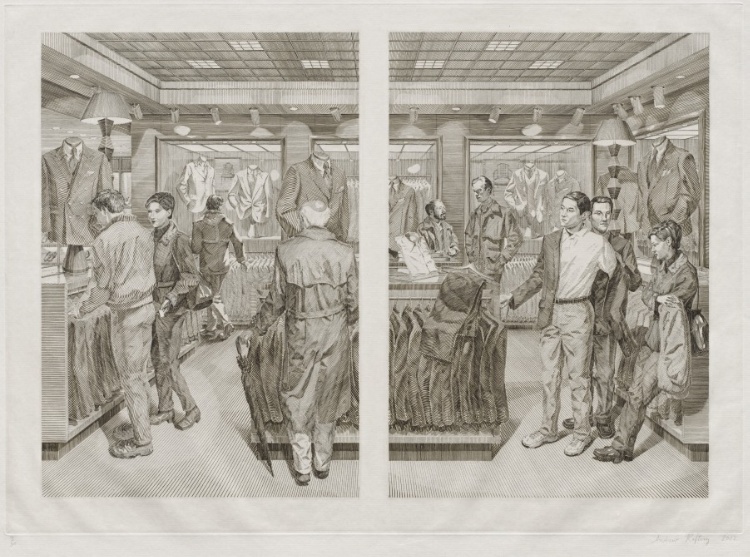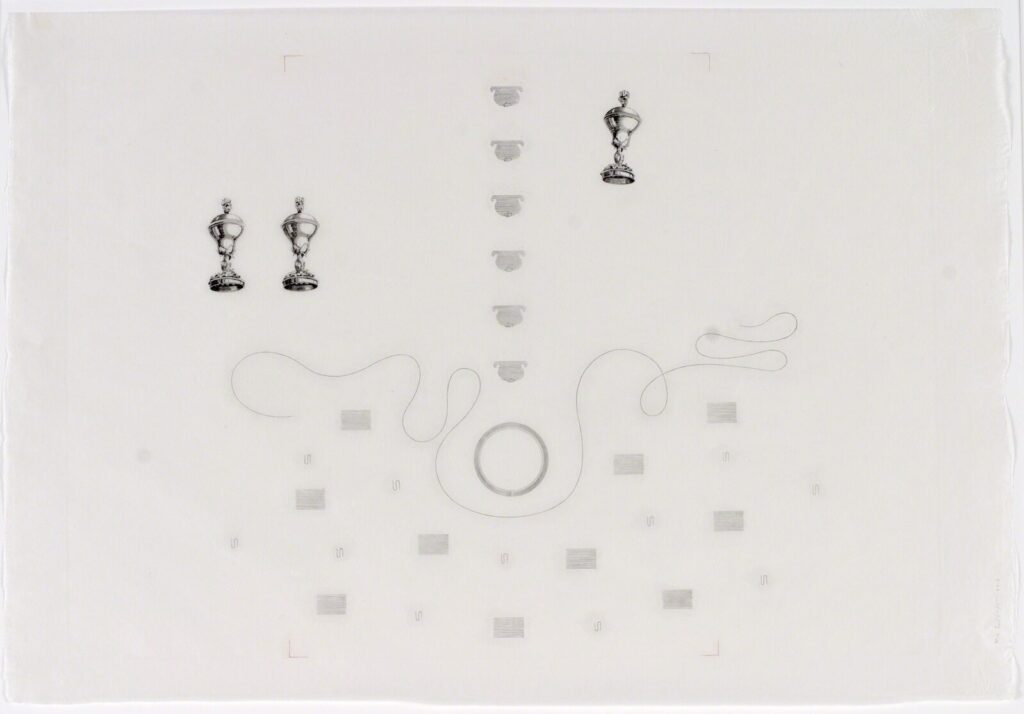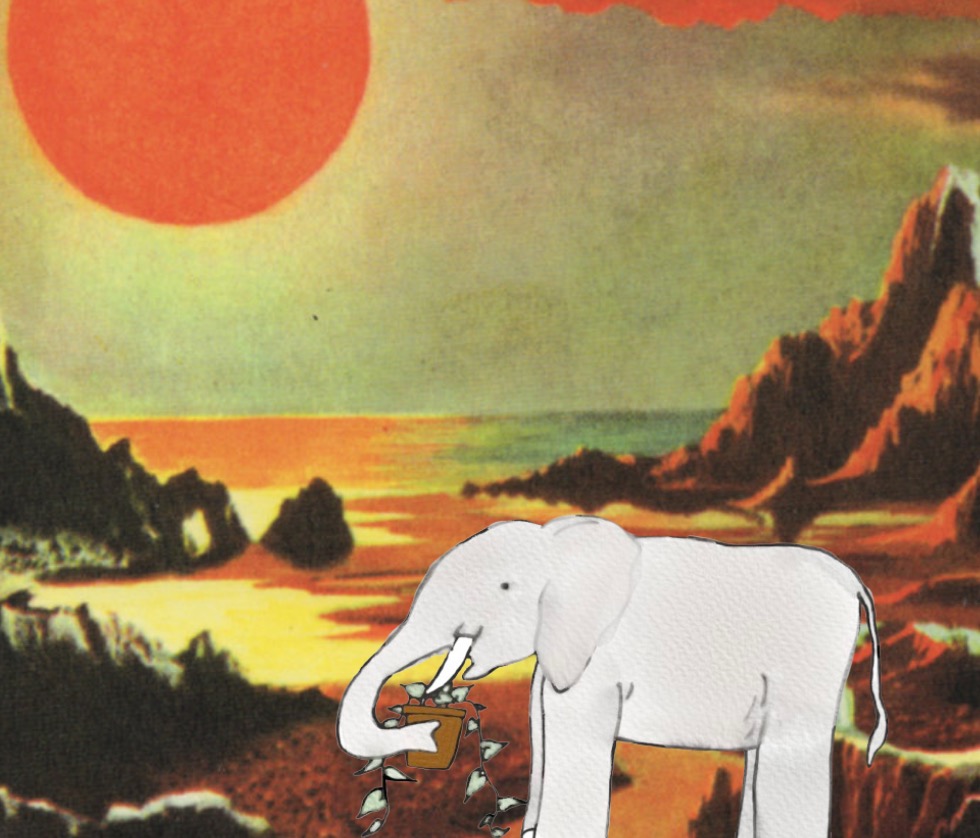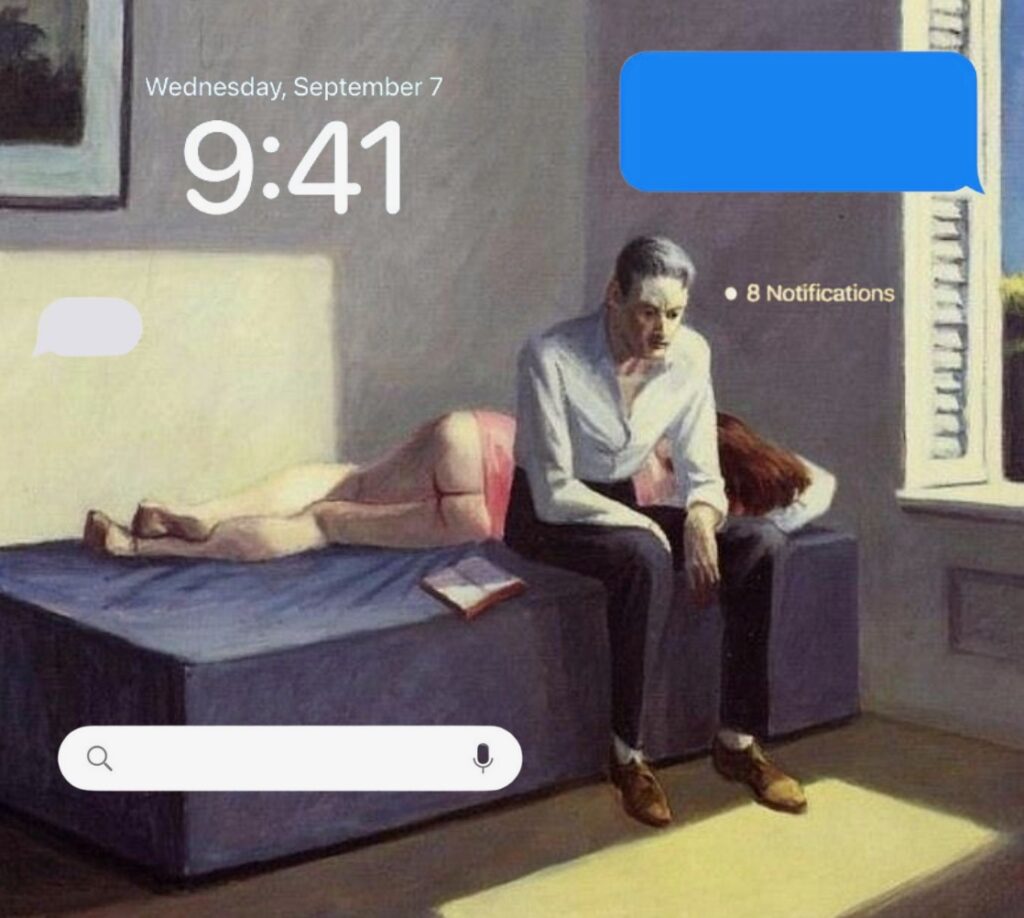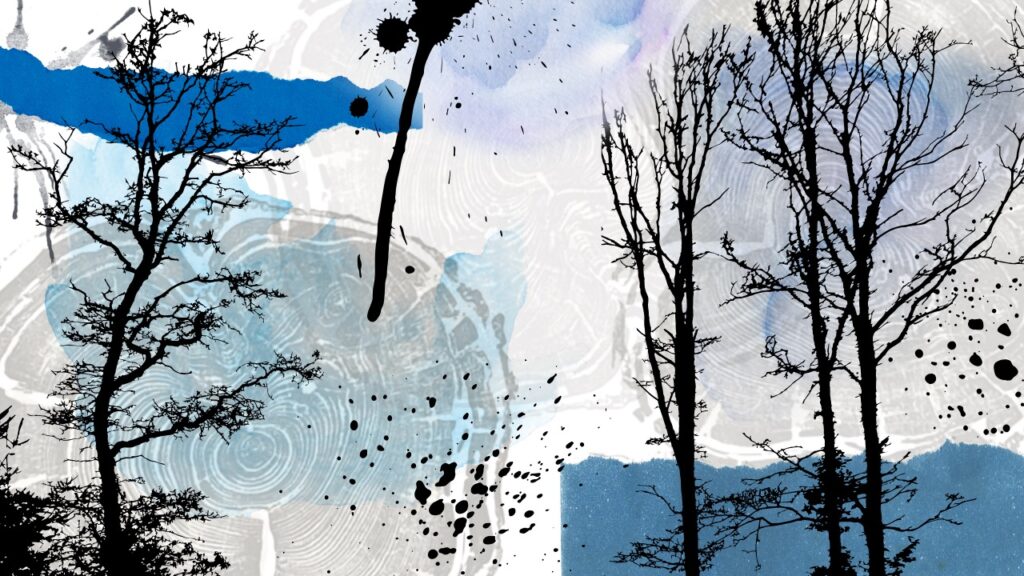
By Maisie Wrubel
In November of 2023, I discovered a new favorite song: “Triptych” by Samia. I was already somewhat familiar with her music, but the song’s lyrics, which describe a willingness–no, a desperate need–to give oneself over completely to someone, struck something within me that I realized I’d felt for ages. This lyrical resonance, combined with its masterful production and melancholy melody, led it to become, within a month, my most-listened-to song of the year.
What struck me most then–and still strikes me now–is Samia’s fearless embrace of femininity in all its shades: the good, the bad, and the ugly hues which many “feminists” would love to deny. In “Fit N Full,” she tackles the impossibilities of diet culture, in “Breathing Song,” she sheds light on the complexities of sexual assault, and in “Triptych,” she embraces a desire to surrender her agency for the sake of another person. Samia’s music is feminist not because it gives us the image of an unshakably strong and independent woman, but because it presents a femininity that is complex, occasionally self-sabotaging, often resistant, and, most importantly, real. This femininity is the trademark of Samia’s music, which continues to color her new album Bloodless.
—
Bloodless centers around the themes of absence, vacancy, and the void, particularly in relation to female identity. The album’s lead single, “Bovine Excision,” was named for the phenomenon in which farmers find their cattle dead and drained of all blood (I’ll spare the other disturbing details), a fact which, upon learning, led Samia to think of her experience with femininity (Rolling Stone, “Samia Shuffles Her Music Library,” 0:08). In an interview with Rolling Stone in March, Samia described Bloodless as an album that seeks to confront how she has built much of her identity around a deified “abstract idea of men” (“Samia Faces Down the Monster”). However, rather than vilifying this process of identity formation, she turns to Judith Butler’s gender theory:
“I was reading a lot of Judith Butler, who’s got this theory that there’s no ‘I’ apart from your social conditioning, so that was really helpful… I am just this conglomerate of all of my experiences and conditioning and so forth… there’s no absolute self to get back to. It’s not like there’s some pure version of you that exists underneath everything you’ve learned to do for others, or that you’ve done out of fear or that’s rubbed off on you” (Paste Magazine, “Samia is Impossible”).
In other words, Butler helped Samia to discover that this male “God” shaping her identity is a natural product of being a woman in a patriarchal society, and there’s no untouched version of herself that exists underneath it.
The counterargument, of course, is that this is a misreading of Butler. Yes, we are all shaped by social norms, expectations, and conditioning, but that doesn’t necessarily mean we are devoid of agency in the face of it. Rather, Butler’s key point in Gender Trouble is that we do still have agency within heteronormative systems of oppression, specifically the agency to “play” with norms and thus reshape them.
However, I do not see Samia or her music as passive, non-agential figures at the feet of patriarchy. Samia’s recognition of the impossibilities of femininity–even if they are not outright denouncements (but who wants a song whose sole lyric is “Fuck you, patriarchy!” anyways?)–is resistance to these standards. Furthermore, what Samia takes from the conclusion that “there is no absolute self” is also that “it’s easier to be an idea than a person,” or, in other words, to be an empty vessel for others to fill (Paste Magazine). While this could be read as passive surrender, it can also be seen as a way to “play” with and find power in the societal expectations that are imposed upon you. As Samia puts it, “the less you give away of your humanness, the bigger you can be in someone else’s mind” (Paste Magazine). Bloodless is an exploration of these implications of the absence of identity: the productive power of letting oneself be an empty vessel for others to fill, the negative consequences of this, and coming to terms with the question of “Who am I?,” or maybe more accurately, “Who was I when I bought these pants?”
—
Despite the absence at the thematic forefront of Bloodless, the album is filled to the brim with complex lyricism, catchy melodies, and relatable emotions. If Honey (2023) was moving because of its rawness, Bloodless is moving because of its metaphors. Lyrics like “You can go outside on a hot night and clap / But you won’t get your blood back” (“Fair Game”) are hauntingly unforgettable, and the few moments of more direct lyricism, such as “I can’t stop crossing the line / And you can’t stop trying to keep me on the other side” (“Dare”), leave you floored. Lyrical motifs, such as blood loss and religion, reappear throughout the album but create a sense of cohesion rather than redundancy. This is mirrored in the production (by long-time collaborators Caleb Wright and Lupin), where snippets of different songs appear in the static between tracks. Additionally, each song’s production reflects its message. “Craziest Person” is filled with sonic elements that could be the murmurs of other voices “in the room,” creating an off-kilter effect. In “Lizard,” the upbeat, bouncing instrumentation makes you want to get “up on the table” and dance, while simultaneously taunting the repeated “don’t do it” in the lyrics. In “Proof,” the most raw and candid song on the album, the production is stripped back to mostly simple guitar.
Every Samia song is a puzzle, and with Bloodless, it’s no different. Her words create vignettes–encrypted, elusive, poetic vignettes–which she describes as “Rumpelstiltskin” due to their riddle-like nature (Paste Magazine). Her lyrics capture moments and feelings without giving too much of themselves away. We get vibrant images–“Over the counter / In the yellow light / Hands with an empty / Glass and a steak knife” (“North Poles”)–and the feelings they’re saturated with, but no more than that. You can easily picture Samia “Up on the table in my headset / Dancing to something sweet” (“Lizard”), but “I’m worth my weight in your image” escapes easy understanding. Similarly, in “Sacred,” “The poetry without the words / The screen door and mackerel clouds / The sounds of southbound hummingbirds” conjures a vivid summer setting. However, the following, “And so you never loved me like you hate me now,” is far from the logical conclusion of the previous lines, leaving you wondering what warrants the “and so.” This is another Samia trademark, traceable back to The Baby (2020). In “Triptych,” the clarity of “Keepin’ you awake, keepin’ you awake on purpose / Hey, did I make a mistake and do my mistakes worsen?” dissolves into the mysterious metaphor of “I will entertain your feet or your hands for a triptych / Sell me at the Strand on the stands for a fat brick.” Samia’s lyrics are rich, juicy, begging for interpretation, but taunting you with their elusiveness.
—
I’ve spent many hours of my life trying to decode Samia’s music, past and present. The fact is that she doesn’t want to tell you what she means— she’d rather leave her lyrics up to interpretation than to bare her soul. (And anyway, isn’t the message of Bloodless that this “soul,” this true meaning, doesn’t exist?) Yet the interpretation is where much of her conceptual brilliance is revealed. In other words, there may be “nothing under these Levis,” but there is so much to explore within the layers as you try to pull them back.
The songs that most obviously address the central themes of absence and female identity are “Bovine Excission,” “Hole In A Frame,” and “Pants,” though all of the tracks on Bloodless address vacancy in some way. “Bovine Excision” explores the tension between the impossible standards of femininity and the simultaneous desire to fulfill them. Samia expresses this in the repeated lines at the end of each verse: “I wanna be untouchable,” “I felt the pea, can I eat it?”, “I wanna be impossible.” Of these three, “I felt the pea, can I eat it?” (one of Samia’s favorite lines, according to her video interview with Rolling Stone) feels the most poignant, addressing both the expectations of female delicacy and sensitivity and those of thinness and food restriction. “Pants” is the most explicit exploration of the nonexistence of “original identity.” In the second verse, Samia asks, “Am I missing something? / Who was I when I bought these pants? / They’re non-refundable / Now I’m questioning everything I am,” expressing the fear that she once was someone whom she has now lost any understanding of. However she tempers this existentialism through the metaphor of clothing, something often thought of as a frivolous female concern. The bridge then repeats “Wanna see what’s under these Levis? / I got nothin’ under these Levis,” a metaphorical assertion of this absence of “original” identity disguised by a mask of eroticism. Both of these lines play with a duality of philosophical depth and “shallow” feminine stereotypes, commenting on the female experience.
One of the other more prominent themes on Bloodless is that the absence of true identity allows one to be an empty vessel for others to fill with their expectations, a process that is heavily colored by gender and is often presented as a kind of performance. In “Spine Oil,” Samia asks, “Do you want to see the heavenly creature?” a question that suggests her transformation into an “ideal” woman within romantic relationships. This idea of the woman Samia “becomes” within romantic contexts permeates the tracks of Bloodless. However, this shaping of her identity is not a one-sided process— it is also something that men do to her. In “Sacred,” she sings, “I walked outside naked / got in the pool and passed out / you saw something sacred,” describing the ways in which people will imbue others with the mysticism they want to see in them. “Fair Game” specifically frames this process of performance and projection as a “game” where she will “light up” for others, letting them see her as something “brilliant.” But it also highlights the consequences of this game: “You can go outside on a hot night and clap / But you won’t get your blood back.” In other words, when you let another drain you of your identity or shape yourself according to their wishes, you cannot “get your blood back,” or undo this process. The changes you make to yourself to fit another person’s desires are not retractable.
—
Bloodless’ magic also lies in its construction, the fact that form mirrors content: not only does Samia sing about vacancy, but the structure of the album creates this same void. Bloodless opens with a somewhat mystifying track called “Biscuits Intro”— it’s 15 seconds long, lyric-less, and contains only vague guitar, crickets, and footsteps on gravel before its static-filled transition into the album’s lead single, “Bovine Excision.” Other than “setting the scene” for the album, it is at first unclear what this song is for. Its purpose is only elucidated once you have listened to the album in its entirety and arrived at the final track, “Pants,” which, in its fifth minute, dissolves into a seemingly whole new song whose instrumentation mirrors that of the opening. Over the faded guitar and hum of crickets, Samia sings:
“Sometime in August, one can of biscuits, you got to hold on
24 Miller Lites, and the dog on the couch with her shirt on
Summer of ‘23, but I can’t remember the last one
Maybe you start living the moment you stop feeling so dumb
Pink blossoms luring you to an invitation from the sapling
Makes you wonder which magical things were already happening.”
In these final lines, Samia reaches her conclusion: if you “stop feeling so dumb” and take the time to appreciate “pink blossoms” and other “magical things [that] were already happening,” you will “start living.” This resolution to live in the present moment, coming at the end of a song about searching for identity, thus also entails a resolution to embrace one’s present self. Samia gives up on trying to get back to some “true” version of herself–who she was when she bought those pants–and accepts the absence of original identity. This conclusion was hinted at in “Biscuits Intro,” but until you pass through every other song on the album, you will not reach it. You must endure the journey of struggling to find your true self and confronting vacancy to realize that this “true self” does not exist. Thus, the mystery of “Biscuits Intro” leads us to the heart of the album. The album itself – every minute between “Biscuits Intro” and the ending of “Pants” – is the void, the vacancy that Samia explores in each song. You, the listener, arrive at her conclusion too. And, mirroring her plea of “I’ll trade the why for how” (“Pants”), she shows you how she got to this conclusion but not the why, choosing instead to leave many of the lyrics up to interpretation, each song not necessarily leading naturally to the next, instead letting there be static between the tracks.
—
Bloodless is by far the most cohesive and conceptually put-together album that Samia has created. Her metaphorical lyricism is at its peak, and her voice is stronger than ever. But musical skills aside, what keeps bringing me back to Samia is her deeply relatable and real expression of the female experience. Her feminism is powerful because it chooses honesty over shame. In a Substack post about Bloodless, Samia says, “I wanted to stop punishing myself by denying that a good portion of the ingredients of my personality were characteristics and attributes I decided, based on empirical evidence or hearsay, men liked.” Her rejection of this punishment-by-denial is what has always spoken to me. Her music admits to all feelings, even those that might be critiqued as “glorifying” passivity or the male gaze. In my opinion, speaking–or singing–the “ugly” truth of the female experience into existence is far more feminist, and far more interesting, than a denial of this truth or an overly basic repudiation of sexism. As she says, “I spent a lot of time being so ashamed of those parts of me, the things that have just stuck to me that I felt like I couldn’t remove,” a sentiment many women can likely relate to (Paste Magazine). Thus, Samia is doing so much more by bringing light to these male-influenced aspects of herself than by withholding or denying them. Self-acceptance for Samia is seeing her present self, this “conglomerate thing,” without digging for its original version and wondering, “Where are you?” It’s embracing the absence and the vacancy. Bloodless shows us her process of getting there.

